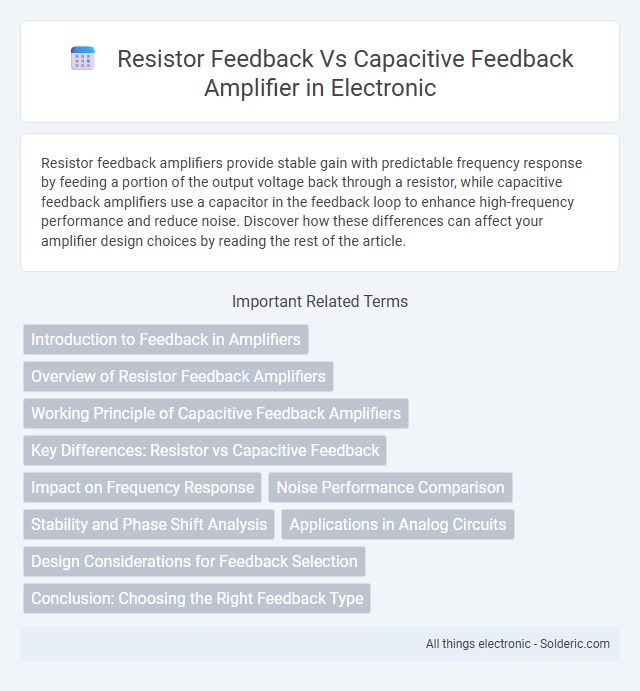Resistor feedback amplifiers provide stable gain with predictable frequency response by feeding a portion of the output voltage back through a resistor, while capacitive feedback amplifiers use a capacitor in the feedback loop to enhance high-frequency performance and reduce noise. Discover how these differences can affect your amplifier design choices by reading the rest of the article.
Comparison Table
| Feature | Resistor Feedback Amplifier | Capacitive Feedback Amplifier |
|---|---|---|
| Feedback Element | Resistor | Capacitor |
| Frequency Response | Wideband, stable gain | Frequency-dependent gain, acts as integrator at low frequencies |
| Gain Control | Set by resistor ratio | Set by capacitor ratio and frequency |
| Noise | Resistor noise contributes to output | Lower noise due to passive capacitor element |
| Applications | General amplification, filters, and buffers | Integrators, oscillators, and frequency-selective circuits |
| Stability | Generally stable if designed properly | May require compensation due to phase shift |
| Power Consumption | Dependent on resistor values | Typically lower due to capacitive feedback |
Introduction to Feedback in Amplifiers
Feedback in amplifiers controls gain, stability, and bandwidth by routing a portion of the output signal back to the input. Resistor feedback provides a stable frequency response and predictable gain, making it ideal for DC and low-frequency applications. Capacitive feedback, in contrast, introduces frequency-dependent gain, enhancing high-frequency performance and phase margin, which can be critical for your high-speed or RF amplifier designs.
Overview of Resistor Feedback Amplifiers
Resistor feedback amplifiers use resistors in the feedback loop to set gain and improve linearity, offering predictable frequency response and stability across a wide bandwidth. The feedback resistor directly influences the amplifier's gain by creating a voltage division between input and output, enabling precise control over amplification factors. These amplifiers are widely applied in audio and sensor signal conditioning due to their simplicity and reliable performance in low-frequency applications.
Working Principle of Capacitive Feedback Amplifiers
Capacitive feedback amplifiers operate by using a capacitor to route the output signal back to the input, creating a frequency-dependent feedback loop that stabilizes gain and enhances bandwidth. The capacitive feedback controls the phase and amplitude response, minimizing distortion and noise in high-frequency applications. You benefit from improved linearity and reduced thermal noise compared to resistor feedback amplifiers, making capacitive feedback ideal for precision signal processing.
Key Differences: Resistor vs Capacitive Feedback
Resistor feedback amplifiers rely on resistors to control gain and stabilize the circuit by providing linear feedback, resulting in predictable bandwidth and frequency response. Capacitive feedback amplifiers utilize capacitors in the feedback path, which introduces frequency-dependent gain characteristics, often enhancing high-frequency performance but potentially causing phase shifts and stability challenges. Your choice between resistor and capacitive feedback depends on the desired frequency response, linearity, and stability requirements for the specific amplifier application.
Impact on Frequency Response
Resistor feedback amplifiers maintain a stable gain over a wide frequency range but may introduce bandwidth limitations due to the gain-bandwidth product of the amplifier. Capacitive feedback amplifiers significantly affect the frequency response by creating a frequency-dependent gain, leading to more pronounced roll-off at higher frequencies and improved high-frequency stability. Understanding the impact of these feedback types on your amplifier's frequency response is crucial for designing circuits with precise gain control and desired bandwidth characteristics.
Noise Performance Comparison
Resistor feedback amplifiers typically exhibit higher noise levels due to thermal noise generated by the resistive elements, which directly influences the overall signal-to-noise ratio. Capacitive feedback amplifiers, by contrast, introduce significantly lower noise since capacitors do not produce thermal noise, making them preferable for low-noise applications. The noise spectral density in resistor feedback circuits often surpasses that of capacitive feedback configurations, especially at high frequencies, where capacitor feedback helps maintain signal integrity with minimal noise contribution.
Stability and Phase Shift Analysis
Resistor feedback amplifiers generally offer better stability due to their linear phase response and predictable gain behavior across frequencies, minimizing the risk of oscillations from phase shifts. Capacitive feedback amplifiers introduce additional phase lag because of the frequency-dependent reactance, which can degrade stability and increase the likelihood of undesired oscillations. Your design choice should consider that resistor feedback maintains consistent phase margins, while capacitive feedback requires careful compensation to ensure stable operation.
Applications in Analog Circuits
Resistor feedback amplifiers are widely used in analog circuits for applications requiring precise gain control and stability, such as audio amplifiers and sensor signal conditioning. Capacitive feedback amplifiers excel in high-frequency applications like RF circuits and integrated filters due to their low noise and reduced signal distortion. Your choice between these feedback types depends on specific performance needs like bandwidth, noise sensitivity, and linearity in the analog circuit design.
Design Considerations for Feedback Selection
Design considerations for feedback selection in amplifiers hinge on stability, frequency response, and noise performance. Resistor feedback offers linear gain control and broad bandwidth with minimal phase shift, making it ideal for low-frequency, low-noise applications. Capacitive feedback enhances high-frequency stability and reduces thermal noise, preferred in wideband or RF amplifiers where phase margin and gain flatness are critical.
Conclusion: Choosing the Right Feedback Type
Resistor feedback amplifiers offer stable gain and predictable frequency response, ideal for general-purpose amplification requiring linearity and low noise. Capacitive feedback amplifiers excel in high-frequency applications, providing superior phase margin and reduced bandwidth limitations, which is crucial for RF and high-speed signal processing. Your choice depends on the specific application requirements, including bandwidth, noise sensitivity, and gain stability.
resistor feedback vs capacitive feedback amplifier Infographic

 solderic.com
solderic.com